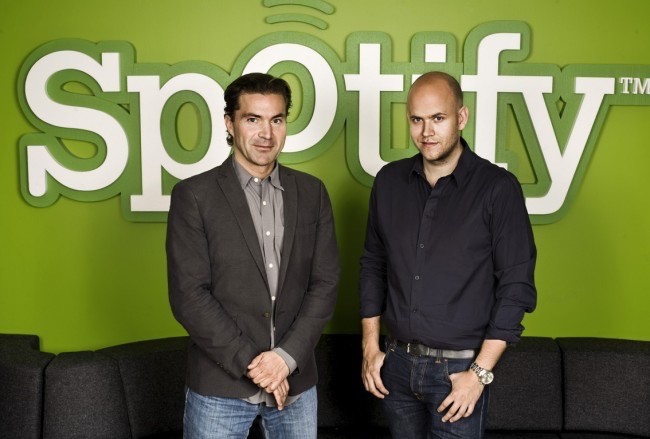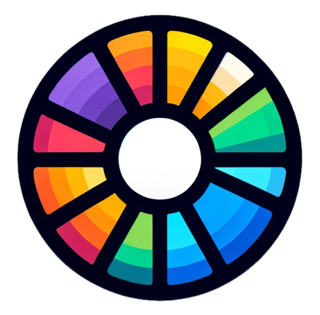| Headquarters | Stockholm, Sweden |
| Founders | Daniel Ek, Martin Lorentzon |
| Industry | Audio streaming, Podcasting |
| Monthly Active Users (as of Q4 2024) | 602 million |
| Revenue (in 2023) | $14.336 billion |
| Employees (as of December 31, 2023) | 9,123 |
| Availability | 184 markets worldwide |

The Origins and Launch of Spotify (2006-2008)
Spotify was founded in 2006 in Stockholm, Sweden by Daniel Ek and Martin Lorentzon. The name is a combination of "spot" and "identify."
Ek was a music fan frustrated by piracy, seeing an opportunity to create a legal alternative to music piracy services like Napster and Kazaa. Lorentzon was the co-founder of TradeDoubler, an online marketing company that had just been acquired.
The two had a vision to create a platform that would make all the world's music available in a simple, affordable way. Their goal was to convince music fans to pay a monthly fee for legal music streaming rather than pirating.
After two years of negotiations, Spotify secured the licensing rights from all the major record labels - Universal, Sony BMG, EMI Music, and Warner Music. This allowed Spotify to launch in Europe in 2008 with a catalog of over 5 million songs.
Spotify launched with two options - a free ad-supported tier and a premium ad-free subscription tier for €9.99 per month. The free tier was initially invitation-only to control growth.
Rapid Growth and U.S. Launch (2009-2011)
Spotify grew rapidly across Europe, hitting 1 million paying subscribers by March 2009 and 2.5 million by September 2010.
In July 2011, after years of negotiations with record labels, Spotify launched in the crucial U.S. market. This was a major milestone, as the U.S. represented the largest market for recorded music.
Spotify's U.S. launch was boosted by a high-profile partnership with Facebook that allowed users to share their music activity on the social network. Mark Zuckerberg personally promoted Spotify on his Facebook page.
By the end of 2011, just 5 months after the U.S. launch, Spotify had over 2.5 million paying subscribers globally.
Continued Expansion and Going Public (2012-2018)
Over the next several years, Spotify continued its rapid global expansion, launching in many new markets across Asia, Latin America, and the Middle East.
In 2012, Spotify removed the invitation requirement for the free ad-supported tier to accelerate growth.
Spotify launched a browser-based web player in 2012, followed by apps for tablets, smartphones, TVs, cars and other devices over the next few years.
New subscription tiers were added, including Spotify Family in 2014 and a hi-fi lossless audio tier in 2017. Video content was also added briefly before being discontinued.
By 2015, Spotify had over 20 million paying subscribers and 75 million total active users across 58 markets.
In April 2018, after months of speculation, Spotify went public in an unusual direct listing on the New York Stock Exchange, avoiding the traditional IPO process. The listing valued Spotify at over $26 billion.
Podcasting, Audiobooks and Acquisitions (2019-Present)
In 2019, Spotify made a major strategic move into podcasting with the acquisitions of Gimlet Media, Anchor and Parcast. This kicked off an aggressive podcasting investment strategy.
Over the next few years, Spotify acquired numerous other podcast companies like Megaphone, The Ringer and Locker Room. It also signed exclusive deals with popular podcasters like Joe Rogan, Alex Cooper and Dax Shepard.
By 2021, Spotify had over 3.6 million podcasts on the platform and had become the leading podcast streaming service globally.
In 2022, Spotify expanded into audiobooks with the acquisition of Findaway. It also launched a new subscription tier called Spotify Premium Duo.
As of Q4 2022, Spotify reported 195 million paying Premium subscribers across 183 markets, along with 456 million total monthly active users. It has paid over $30 billion in royalties to music rights holders since launch.
Spotify continues to invest heavily in areas like personalization, discovery algorithms, and new content verticals like live audio. It faces increasing competition from Apple Music, Amazon Music, YouTube Music and others in the booming audio streaming market.
With its early mover advantage, massive user base, and continued innovation, Spotify remains the global leader in music streaming as it enters its second decade in business.
 Spotify Pie
Spotify Pie